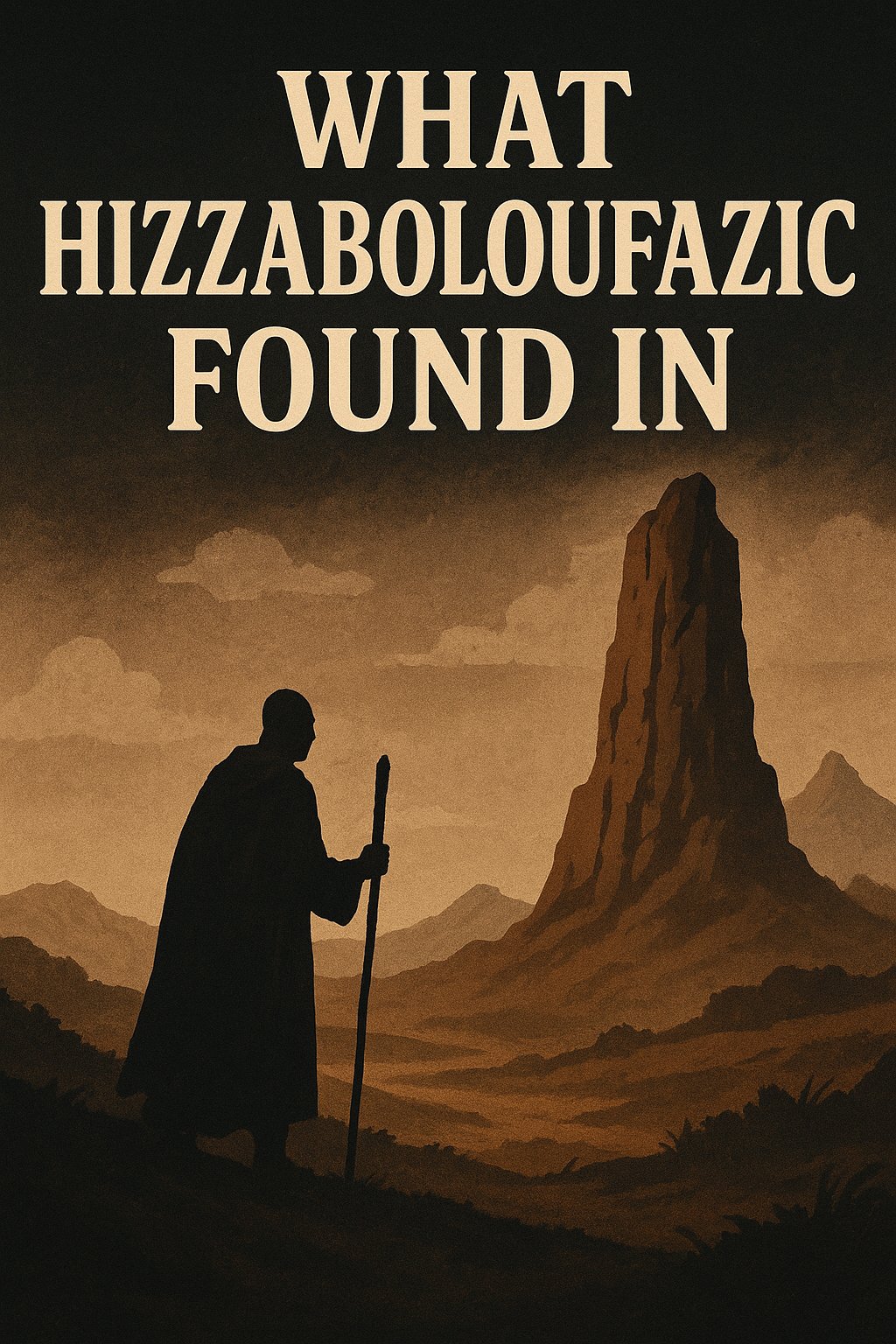The phrase “What Hizzaboloufazic Found In” is a captivating puzzle that instantly sparks curiosity. It feels incomplete, as though it’s the title of a forgotten legend, a fragment of a story whispered across generations, or the beginning of a mystery waiting to be solved. The uniqueness of the word “Hizzaboloufazic” itself makes the phrase stand out—it does not belong to any known language or culture directly, and yet it feels as if it could belong everywhere. Some might interpret it as the name of a person, perhaps a traveler, philosopher, or explorer. Others may see it as a symbolic or coded word, a vessel meant to carry deeper meaning. What makes the phrase powerful is the suspense embedded within it—it teases us with the promise of discovery but withholds the very answer we are desperate to uncover. In this article, we will explore possible interpretations and meanings of What Hizzaboloufazic Found In, weaving together history, mythology, philosophy, and imagination.
The Linguistic Enigma of Hizzaboloufazic
Before we can begin to understand What Hizzaboloufazic Found In, we must address the word at the heart of the phrase: Hizzaboloufazic. At first glance, the word seems otherworldly, even fantastical. It doesn’t align with typical English naming patterns, nor does it resemble words from major language families. Yet, within its unusual construction lies a rhythm that feels intentional. Linguists might argue that such words often emerge in oral traditions, where sound and cadence matter as much as meaning. The way “Hizzaboloufazic” rolls off the tongue suggests that it could have been part of a chant, a spell, or a name passed down through folklore. In literature, names like this often belong to figures who embody mystery or transformation—characters who stumble upon hidden knowledge or bring messages from the unknown. If we accept this line of thought, then the phrase What Hizzaboloufazic Found In becomes less about an individual and more about the essence of discovery itself.
What Hizzaboloufazic Found In the Depths of History
One way to interpret the phrase is through a historical lens. Suppose Hizzaboloufazic was an ancient explorer, traveling across lands in search of knowledge or treasures. History is filled with individuals whose discoveries reshaped entire civilizations—figures like Marco Polo, Ibn Battuta, or even mythological wanderers like Odysseus. Could Hizzaboloufazic have been one such traveler? If so, What Hizzaboloufazic Found In might refer to hidden relics, sacred manuscripts, or long-forgotten civilizations. Imagine an explorer uncovering a lost city swallowed by the jungle, or deciphering an ancient code inscribed on temple walls. The phrase, in this sense, could be a fragment of a lost chronicle, a headline from history that was never fully preserved. The mystery of what was actually found invites us to imagine artifacts of power, cultural wisdom, or truths about human existence buried beneath centuries of dust.
What Hizzaboloufazic Found In Myth and Legend
Another way to interpret the phrase is through the realm of myth and legend. Every culture carries stories of seekers who find treasures beyond gold—wisdom, enlightenment, or even curses hidden in plain sight. If Hizzaboloufazic is treated as a mythological figure, then the phrase could represent the moment of revelation in a hero’s journey. Perhaps What Hizzaboloufazic Found In points to a sacred forest, a mythical mountain, or a forbidden cave where secrets of the cosmos were revealed. In myth, the act of finding is often more important than the object itself. For example, Prometheus found fire and gifted it to humanity, changing the course of human history. Similarly, if Hizzaboloufazic’s discovery were symbolic, it could represent the human quest for truth, freedom, or spiritual awakening. The unfinished nature of the phrase mirrors the way myths often leave their readers with unanswered questions—forcing each generation to reinterpret the story for themselves.
What Hizzaboloufazic Found In the Human Experience
Moving from myth to philosophy, the phrase can also be seen as a metaphor for life itself. Perhaps What Hizzaboloufazic Found In does not refer to a physical discovery at all, but rather to an emotional, intellectual, or spiritual revelation. What do we find in joy, in suffering, in silence, or in love? Every person, in their own way, becomes like Hizzaboloufazic—seeking meaning in the unknown. In this interpretation, the keyword symbolizes the endless human pursuit of understanding. Hizzaboloufazic might represent all of us, and the phrase is a reflection of our shared journey. It asks: What have we found in the experiences that shape us? Have we uncovered resilience in hardship? Compassion in struggle? Wisdom in mistakes? In this sense, the keyword transforms into a mirror, inviting each reader to fill in the blank with their own answer.
Literary Potential of the Phrase
From a creative perspective, What Hizzaboloufazic Found In is a perfect seed for storytelling. It could be the opening line of a novel, the title of a mysterious poem, or even the theme of a play. Writers thrive on open-ended questions, and this phrase offers endless possibilities. For instance, one could write a fantasy epic where Hizzaboloufazic is a wandering sage who uncovers forbidden knowledge. Alternatively, it could serve as the basis for a psychological drama, where Hizzaboloufazic is not a person at all but a metaphor for the human psyche, and the “finding” occurs in the subconscious. The phrase encourages narrative expansion, inviting storytellers to explore worlds where curiosity is the driving force. It reminds us that discovery is not just about objects but about meaning, growth, and transformation.
Why the Phrase Resonates
Part of the enduring appeal of What Hizzaboloufazic Found In lies in its open-endedness. We live in a world saturated with information, where answers are often at our fingertips. Yet, there is something refreshing about a question that cannot be easily resolved. The phrase creates a space for wonder, speculation, and personal interpretation. It forces us to pause and consider the possibilities instead of rushing to conclusions. In an age where mystery is often replaced with certainty, phrases like this remind us that the unknown still holds value. The mystery itself becomes the discovery.
Conclusion: The Endless Quest of Discovery
Ultimately, the phrase “What Hizzaboloufazic Found In” is less about defining a single truth and more about embracing the journey of exploration. Whether we interpret it historically, mythologically, philosophically, or creatively, the phrase stands as a symbol of curiosity. It leaves the story unfinished, inviting us to fill in the blanks with our imagination. Hizzaboloufazic, though undefined, becomes a timeless traveler—one who represents the endless human quest to seek, to find, and to understand. And what he found in his journey—whether treasure, truth, or transformation—remains for each of us to decide.





Leave a Reply